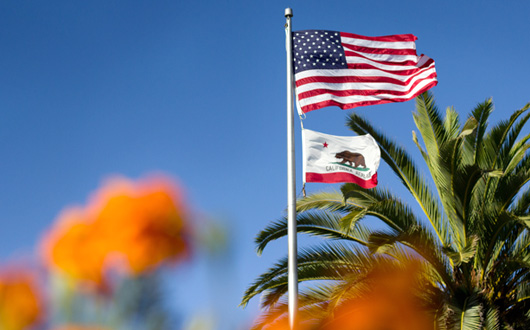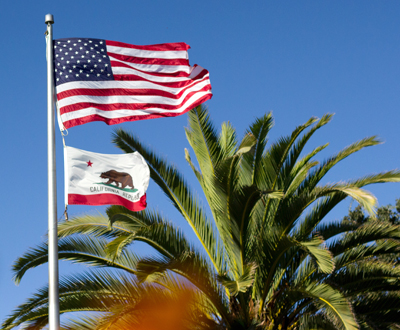
Events on Tower Lawn and at Spartan Chapel will reflect on the terrorist attacks, which will also be discussed in an international politics class (Christina Olivas photo).
Although 12 years have passed since the terrorist attacks, the events of the day remain fresh on the minds of many at San Jose State.
The Veterans Student Organization will host a memorial service from 8:30 to 10:03 a.m. Sept. 11 on Tower Lawn. Speakers will pause three times for moments of silence, signifying each plane crash.
Canterbury Bridge will host a discussions open to all faiths. “The Root Causes of Violence” will begin at 3 p.m. Sept. 11 in the Guadalupe Room of the Student Union.
Reflecting on 9/11 will also be taking place in many classes campuswide. SJSU Today asked Associate Professor of Political Science Karthika Sasikumar about her experiences.
Not only was she teaching in New York on 9/11, but she continues to teach international politics today, connecting an event that many students are too young to recall personally to the shocking news out of Syria this week.
***

Karthika Sasikumar, second from left, leading a first-year writing seminar, “Militaries and Societies in the Modern Age,” at Cornell University shortly after Sept. 11, 2001 (photo courtesy of Robert Barker/Cornell University Photography).
SJSU Today: Please tell me briefly about your experience teaching. Were you in the classroom on 9/11?
Professor Sasikumar: I’m Indian and my family still lives in India. I was living in Ithaca, NY, in 2001. I was a graduate student at Cornell University on 9/11. It was a beautiful Tuesday morning and I was on a bus to campus when I heard about the planes. I rushed to the computer lab and tried to find out what was going on. Most U.S. news websites had crashed due to heavy traffic, so I started looking at Indian websites. So right from the start I had a different, international perspective on the event.
At the time, I was teaching a first year writing seminar with 17 students. It was titled “Societies and Militaries in the Modern Age.” It was the first class where I was the instructor. And I was two weeks into it—when this hit.
Many of my students were from New York City or had family there. Many of them lost either someone they knew or had close family or friends that had lost a loved one. When I saw them for the first time after 9/11, they looked stunned and stiff. For most, it was their first encounter with death.
I changed the syllabus and started looking up material on Afghanistan, as it became clear that the United States would invade that country. In class, I had to be careful because there was a lot of anger and unreasoning emotion which I wanted to respect—I tried not to make the discussion too academic. At the same time, I emphasized to students that it was important to ask hard questions about U.S. policy.
SJSU Today: Tell me a little bit about how your approach to leading students through reflection on 9/11 has changed over the years.
Professor Sasikumar: 9/11 was a very important milestone in my life. It also changed my research. I included a chapter on the emerging counter-terrorism regime in my dissertation. Right after 9/11, Americans, especially the youth, were extremely motivated to learn about foreign countries in general and particularly about South Asia and Islam. Many students told me it was the event that motivated them to become political science majors.
As the years passed and emotions faded, I became less hesitant about questioning people’s assumptions about 9/11. The war in Iraq was key in making Americans more cynical and more insular.
SJSU Today: And how has the student response changed as the years go by, keeping mind your move from New York to California?
Professor Sasikumar: Last year, I used the anniversary of 9/11 as a prompt for an online discussion for my class “War and Peace” (POLS 150). I asked students, who had just encountered various definitions of war, to reflect on the “war on terror.” I started by asking them to recount their own emotions on 9/11.
I was in for a shock. Several of the responses were banal and casual. I realized that there was a new generation of students entering my (virtual and real) classroom. These were students who were too young to have their own memories and were filtering them through the media and family recollections. One student wrote about how her kindergarten teacher lined them up for early dismissal! I can no longer assume that 9/11 was as important to this new generation as it was to me. I would say that distance from the event, rather than distance from the East Coast, has been more important in this regard.
SJSU Today: Finally, in class tomorrow, will you tie 9/11 and Syria? How does our 9/11 experience as a nation inform our response to Syria?
Professor Sasikumar: In class tomorrow (“United States Foreign Policy,” POLS 154) the syllabus topic is foreign policy decision-making. The assigned readings talk about the divisions within the U.S. State Department as well as the conflict between the Pentagon and State.
I will begin by asking students if they think 9/11 influenced them and their leaders. Then I will have them read a piece called “The Taming of Samantha Power,” in which a prominent voice calling for intervention is shown to be tamed by the post-9/11 hatred of the United States. Yet Power is also making the case for the invasion of Syria, by predicting that inaction now “eventually compels us to use force anyway down the line, at far greater risk and cost to our own citizens,” which I take to be a reference to 9/11 and the policies that led up to it—specifically the U.S. decision to extract itself from Afghanistan after the end of the Cold War.

